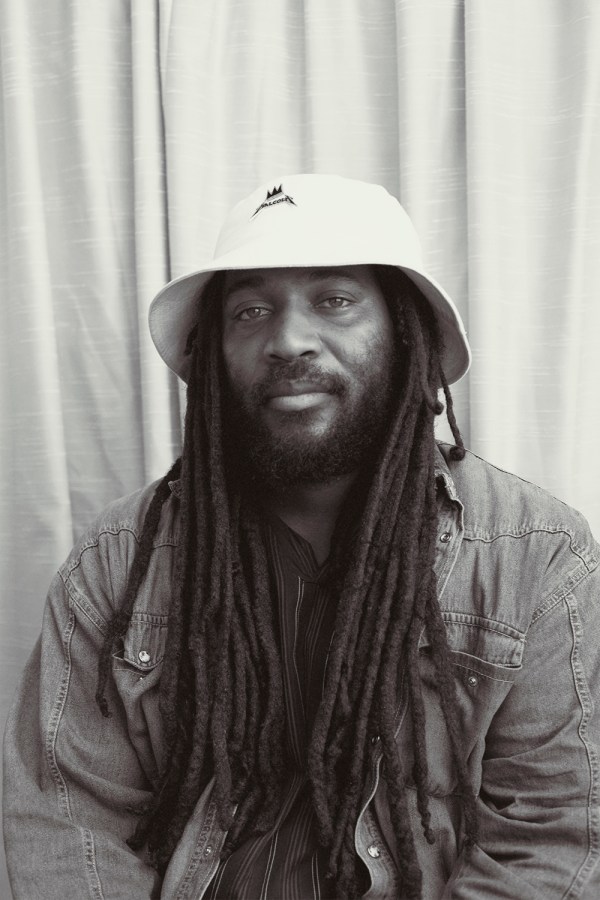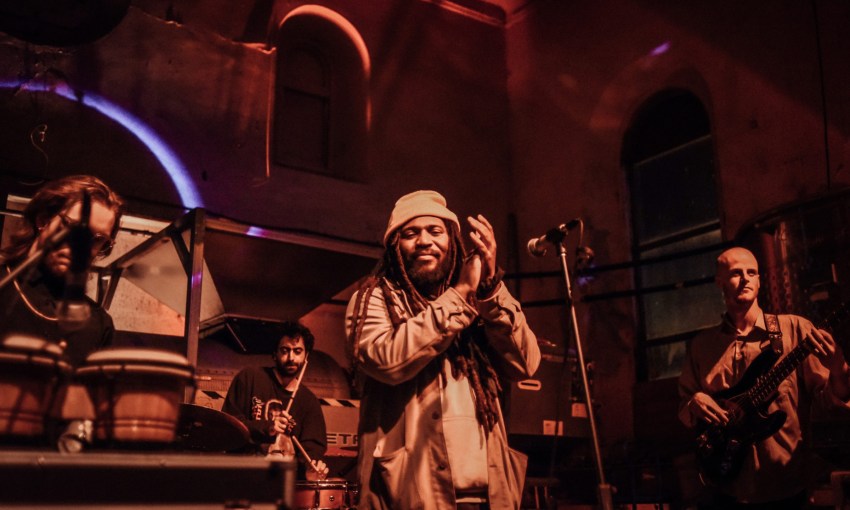The lyrics penned by poetic polymath Dominic Wagner can be described as crafty, creative and cunning. On the brink of a record release with SO.Crates, we spoke to the musician about how he builds his hip-hop worlds.
Enter Cazeaux O.S.L.O.’s cerebral wonderland
Dominic Wagner is known around Australia for the soulful and spiritual universes he creates through rapping and singing with bands SO.Crates, Sunset Cities and Man Made Mountain.
What those listening to his music, which he makes under the nom de plume Cazeaux O.S.L.O, are likely unaware of are his golden eyes. They shine like garnets.
Connect with Cazeaux O.S.L.O’s projects:
SO.Crates
Sunset Cities
Man Made Mountain
SO.Crates’ album Malcolm After Mecca drops next month.
CityMag notices the Adelaide-by-California poet’s peepers peeking through his long brown dreadlocks while he looks down at the Exchange Coffee menu. We met at the East End café in November last year to chat about his vast discography and upcoming SO.Crates album Malcolm After Mecca.
For those uninitiated in the world of Cazeaux O.S.L.O., his music bursts with the energy of exploding stars.
For the neo-soul-inspired hip-hop outfit SO.Crates, he riffs on morality, optimism and his daughter, while flirting with literary techniques like iambic pentameter and enjambment. He tongue twists metaphors and references like cherry stems.
As Dominic speaks to us about the upcoming record, we’re drawn, through his eyes, into the immense universe swirling within his skull. We wonder about the worlds contained within.
“The idea of that album is all drawn from being away from home and having to witness atrocities,” Dominic says of Malcolm After Mecca, which he provides vocals for alongside Melbourne-based producer Skomes.
These atrocities were the murder of George Floyd and the tearing of the social fabric in the United States that resulted, as the long-overdue Black Lives Matter protests spread across the country and world. It was difficult for Dominic to watch this from afar.
“Having to feel the weight in my mother’s voice, feel the weight in my father’s voice, my sisters,” Dom says. “Them kind of being closer to the epicentre of the horrible, horrible things, and me being here and being at a distance and feeling relatively safe,” he says.
“That album was about healing, trying to find that healing, trying to offer that healing to people. And at the same time, trying to explain my own story to myself, to justify me being here, and not being dead in the street.”
—Dominic Wagner

Dominic Wagner aka Cazeaux O.S.L.O
Music-making was Dominic’s way of contributing while stuck on another continent, and it was a salve for his feeling of helplessness.
“The thing about music is that we can create these little utopian worlds,” he says. “And they may only last a rehearsal and they may only last an albums-length. But we built that.”
A waiter arrives at our table and Dominic orders a tea. He’s abstaining from coffee, he says. Instead of relying on something to propel him forward, he wants to build internal combustion of his own.
“I’m trying to develop discipline because that’s one of my weak points,” Dominic says. “We all know our own weaknesses. We’re our harshest critics.”
Dominic is a father of three and a busy musician, forging a career in Adelaide after leaving a life in Melbourne.
“I was living in Melbourne for a long time and we had a lot of friends and stuff, but once you have kids, you start to realise there’s a bit of a separation between you and some of the friends that you’ve known for so long,” he says.
“We moved a few years before the pandemic hit, so it ended up being a really good move.”
He has also long fostered a love of the written word. As a voracious reader and a student of journalism during his college days in New York, he places a high value on the power of language.
We ask if he’s considered longer form writing, like a novel, but he says he’s not there yet. Writing lyrics and creating accompanying video clips gives him the ability to create stories in a more manageable way.
“I used to make videos when I was a kid,” Dominic says, laughing. “It was an extension of ‘Oh, gosh, stole Dad’s camera, let’s make a movie’.”
His video clips are always playful, colourful and clever. The recent jazzy single ‘Beaut-i-full World’, featuring Zima and Kalala, has stop-motion toys taking over a rumpus room. The clip for the smooth-like-butter ‘Fresh Gold Bloom Age’ starts with Dominic being fired by Summertown Studio’s Sharni Honor before his character literally shoulders the weight of the world.
Dominic sees the books and records littering his life as cultural time capsules, collecting the tone, feeling and flavours of their surroundings. He wants his music to be immortal in this way, too.
“People are leaving these documents for us to explore,” Dominic says. “I feel crazy by this access.”
At the end of our chat, Dominic says he’s brought us some of his records to listen to. They’re accompanied by a tiny box of incense.
We’ve heard a lot about the themes of Malcolm After Mecca, but we’re still curious about what it sounds like. What instruments will be present, and what kind of writing fills the gaps between sounds. Dominic hesitates.
“I don’t know what people expect when they hear SO.Crates,” he says. “You’re going to hear beats and raps, and you’re going to hear me trying to do the best writing I’ve ever done. That’s really the challenge I felt.”
Discover more of the city’s sounds here.





